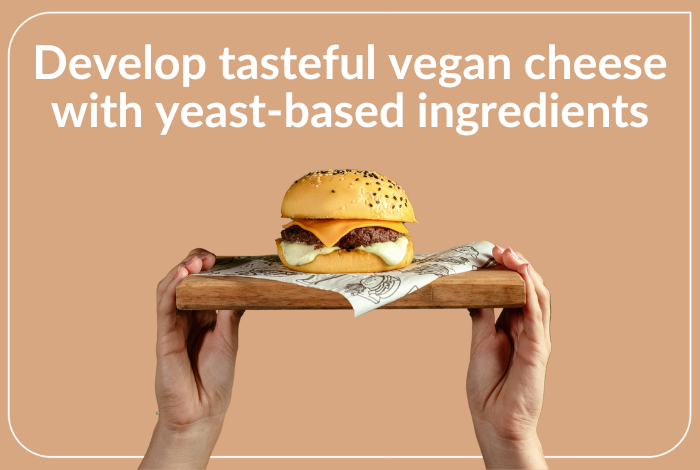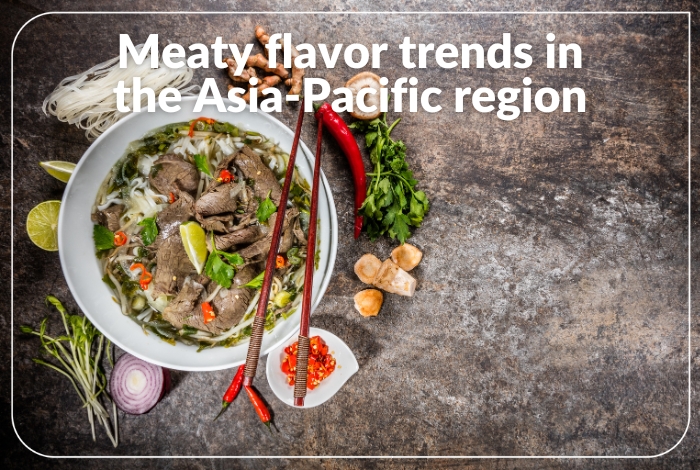Blog
Savoury crackers market in Asia-Pacific
Did you know that in the Asia-Pacific region, 26% of consumers enjoy meat and poultry products two to three times a week? Meat remains a staple in consumers' diets, influencing a wide range of food ca
15 June, 2025Sweet biscuits market in Asia-Pacific
Did you know that in the Asia-Pacific region, 26% of consumers enjoy meat and poultry products two to three times a week? Meat remains a staple in consumers' diets, influencing a wide range of food ca
15 June, 2025Improve noodle taste in India market using yeast extract
Discover how Biospringer by Lesaffre leverages yeast-based fermentation and taste receptor science to improve flavour and nutrition in plant-based foods
13 June, 2025How yeast-based ingredients improve taste in plant-based foods
Discover how Biospringer by Lesaffre leverages yeast-based fermentation and taste receptor science to improve flavour and nutrition in plant-based foods
22 May, 2025Clean label solutions for toddler food in Indonesia
An Indonesian food manufacturer reached out to us with an objective: “I want to replace MSG and salt in my toddler food formulation”. Our experts at Biospringer Asia Pacific took on the challenge, wor
06 May, 2025Develop tasteful vegan cheese with yeast-based ingredients
As vegan cheese is trending, discover how to meet taste and nutrition demands with yeast-based solutions and a step-by-step cheddar recipe.
17 April, 2025Webinar: Tackle cocoa crisis with Springer® Signature
Our experts hosted an exclusive webinar about cocoa reduction discussing how our yeast-based solutions can help food manufacturers.
25 March, 2025The challenge of reducing salt in Malaysian snacks
Asia Pacific ranks first in the savory/salty snacks and snacks categories launches, accounting 44% of market share. It is also the top region in terms of sales value. Now, let’s focus more specificall
11 March, 2025How to reduce cocoa powder with yeast-based ingredients
Reducing cocoa in recipes without compromising taste, colour or quality is a challenge. With Springer® Signature, a natural yeast-based solution, you can create delicious cocoa-based recipes.
05 March, 2025Meaty flavor trends in the Asia-Pacific region
Did you know that in the Asia-Pacific region, 26% of consumers enjoy meat and poultry products two to three times a week? Meat remains a staple in consumers' diets, influencing a wide range of food ca
25 February, 2025Rising cocoa prices: Impact on consumers and the food industry
Cocoa prices are soaring worldwide, creating significant challenges for both consumers and the food industry. Biospringer by Lesaffre offers a premium solution for cocoa reduction with yeast-based ing
05 February, 2025How is the rise of GLP-1 medications reshaping the food industry?
Thanks to yeast-based solutions, food manufacturers can adapt to the changes in consumption habits brought about by GLP-1 medications.
28 January, 2025Join Biospringer at Fi Europe 2024 – alongside Savory Ingredients
Biospringer by Lesaffre will participate in Fi Europe 2024 in Frankfurt from November 19-21, alongside other Lesaffre divisions and Savory Ingredients, to offer you an exclusive tasting experience!
12 November, 2024Improve the flavor of your chicken soup recipe
Our expert in Thailand has been working with a food formulator to improve chicken flavor in a chicken soup recipe using 3% of yeast extract.
24 October, 2024Formulate clean label sauces to comply with Malaysia’s 2024 HCL
This year, the Malaysian Healthier Choice Logo regulation has been strengthened. As a result, food formulators are expected to further reduce sodium & sugar levels. Let's see the changes implemented.
23 October, 20242024 Convenience foods market in Asia Pacific
In the Asia Pacific region, convenience foods stands as the leading category within the savory food sector. Discover the main trends within...
10 September, 2024Innovating amidst sugar reduction regulations in Asia
Discover how Biospringer's yeast extracts can reduce sugar by 20% in sweet soy sauce application.
16 August, 2024Join Biospringer at FI India to taste our ingredients solutions
We are thrilled to announce our participation in FI India event, which will be held in Bangalore from September 25th to 27th, 2024.
07 August, 2024Solution for sodium reduction in snacks without sacrificing taste.
Our experts in India have been working with a leading manufacturer to reduce sodium levels in snacks by 10% using natural yeast extract.
12 July, 2024Less salt for a healthier life
Our Biospringer team of experts has been studying and keeping a very interesting track of today and tomorrow’s trends. One of them is salt reduction, rising worldwide. They have summarized it in a few
23 May, 2024Smoke flavorings: towards stricter European regulations
Smoke flavors can be found in a wide variety of products, including ready-made meals, meat and fish, snacks, sauces, and certain soups. Since they were first approved, they have been increasingly used
16 April, 2024Biospringer is getting ready to make an impact
We are pleased to announce our participation in two major events in the food industry: Gulfood Manufacturing in Dubai from November 7th to 9th, 2023 and followed by Food Ingredients Europe in Frankfur
24 October, 2023Processed meat industry in Asia Pacific: Unveiling the market potential
The processed meat market in the Asia Pacific region is fast-growing, fueled by changing lifestyles and increasing consumer demand for convenient, ready-to-eat meat products. It presents abundant oppo
16 October, 2023Ecovadis Gold rating for Biospringer by Lesaffre
We are delighted to share this great news with you: Biospringer by Lesaffre has just obtained its Ecovadis score and we have achieved gold certification for 2023-2024! It is a meaningful achiev
04 October, 2023Discover our new Biospringer’s Springer® Signature SY101
Biospringer by Lesaffre developed a new smoky-flavored, yeast-based ingredient to address a growing need in the food industry
15 September, 2023Biospringer, an active partner in the plant-based food Flavor and Texture consortium led by NIZO food research
In 2021, Biospringer decided to join a consortium comprising research organizations and companies from across the food production chain, whose goal is to understand and resolve taste and texture issue
25 August, 2023We’re celebrating our 150th anniversary
Named Springer, then Fould-Springer and finally Biospringer, the company was the first yeast factory established in France. For more than a century, Biospringer has been standing out
23 August, 2023Webinar: Health and Wellness in Asia Pacific
Our two local experts, Bee Chen Lim Biospringer Asia Pacific Product Manager, and Kevin Lwe, Biospringer Asia Pacific Culinary Centre Manager, presented a 20-minutes webinar on salt and sugar reductio
21 June, 2023The impact of salt reduction regulations in Asia Pacific
Consumers are seeking healthy food, and this often includes salt reduced products to limit the risks of diseases, mainly cardiovascular.
05 April, 2023The fish and plant-based fish market in Asia Pacific
Our experts based in Singapore illustrated the key market data concerning fish, seafood, and analogues
05 April, 2023Boost taste profile of fish, seafood, and analogues with yeast extracts
Asia has the largest seafood consumption worldwide. Let’s explore how yeast extracts can improve the taste experience of fish, seafood, and analogues.
28 October, 2022The impact of COVID on Snacking
The spread of the coronavirus has had a strong impact on the snacking market, consumers have now new expectations regarding snacks.
26 September, 2022Launch of an exciting new campaign #poweredbyyeast!
Yeast has been used for thousands of years to make many vital products. However, many users are still not aware of what is yeast. Discover it in our article!
22 September, 2022Inflation outlook: cost optimization with Biospringer yeast extracts
Discover in our webinar how yeast extracts can be a perfect fit to face current inflation challenges, as it may replace and optimize food manufacturers’ current food ingredients.
30 August, 2022Learn how your plant-based fish can beat the stream
The market of seafood alternatives is taking off. You wish to develop seafood alternatives ? Here are the keys to understanding this new market, its challenges, and how yeast-based ingredients can mak
21 July, 2022Biospringer Asia Pacific: a regional expertise to better understand consumers’ expectations
Our main strength is to have international teams, with complementary expertise in different application segments and deep knowledge about local markets and local needs. That allows us to be as close a
04 July, 2022Unlocking the Asian tastes with yeast extract
Consumers are seeking authentic region-specific cuisines, we explored the key local taste profiles across Asia to identify the most popular ones.
25 May, 20225 things to know about the instant noodles market
With more than 100 billion servings consumed annually, instant noodles’ demand is growing every year. Discover the 5 things you need to know about this market.
25 April, 2022The flourishing market of instant noodles in Asia Pacific
With more than 100 billion servings consumed annually, instant noodles' demand is growing. Learn more about consumers expectations.
21 March, 2022Follow a vegan cheddar recipe step by step
Discover the different steps of this innovating vegan cheddar recipe realised by Marine, our food applications specialist.
28 February, 20226 things you should know about cheese analogues
The global market for cheese alternative is booming ! Dicover the 6 things you should know about this growing market.
25 February, 20224 Steps to Find the Right Ingredient Supplier
Setting up a precise and coherent brief is an essential step to be certain to find the appropriate supplier and the correct ingredient.
23 February, 2022Criteria to consider when choosing the ideal yeast extract
Due to its complex characteristics, choosing the right yeast extract is an essential decision. Discover in this article what characteristics you should consider when buying yeast extract.
07 February, 2022Why is Biospringer the best supplier for you ?
Searching for an ingredient supplier can be a difficult task, discover the six reasons why you should choose Biospringer as your supplier.
07 February, 2022Craft the world’s most delicious and innovative alternative meats
Our experts analyze the alternative meat solutions available on the market. They also provide an exhaustive list of criterias you should check before choosing your ingredients.
21 September, 2021White paper about salt reduction in Asia Pacific
Discover how yeast ingredients can offer natural solutions to help food formulators in Asia Pacific achieve up to 30% salt reduction while preserving the organoleptic properties
21 September, 2021Asia Pacific – Unlocking taste with sustainable and clean-label yeast extract
Discover how yeast extract can help you to formulate regional taste in key applications such as Japanese roasted sesame salad dressing, Indian masala oats
21 September, 2021Read our white paper about yeast ingredients for flavorful low-salt foods
Our white paper highlights how yeast ingredients can help food formulators reduce salt while preserving the organoleptic properties of their recipes.
21 September, 2021Discover our white paper about yeast ingredients for a successful low-sugar formulation
More than half of consumers (53%) are actively choosing foods with low sugar or no sugar, while 48% are doing the same for soft drinks…
21 September, 2021How to twist to a flavorful meat analogue?
Consumers, strongly driven by health and environmental concerns, have high expectations and strict requirements for meat alternatives.
27 May, 2021The 3 reasons why consumers crave meat analogues
The global meat substitutes market is projected to grow at a CAGR of 7.9% in the coming years. Meat analogues are seen by flexitarians...
27 May, 2021Salt reduction: reformulation challenges in Asia Pacific
We have established a portfolio of dedicated yeast extract solutions in Asia Pacific (APAC). The objective is to help developers reduce salt in foods ranging from snacks, sauces, and seasonings, to pl
22 April, 2021Biospringer reveals yeast extract solutions for seafood, meat and dairy analogues in Asia Pacific
“Soy, beany, green, and other off-notes are naturally present in plant-based proteins" notes Vicky Tio, Biospringer Senior Food Technologist. “These are common technical challenges faced during the d
21 April, 2021Biospringer’s full range of yeast-based food solutions
For us at Biospringer, 2021 marks an exciting turning point in our history and brand story as a whole. We’ve been leading the way...
15 March, 202110 reasons to choose yeast protein in food formulations
Discover 10 reasons to choose yeast protein compared to other alternative proteins available on the market on our short infographic!
18 February, 2021Meet Pauline Spolaore, Bioprocess Team Manager and R&D Coordinator at Biospringer
Pauline Spolaore, Bioprocess Team Manager and R&D Coordinator answered a few questions for the International Day of Women and Girls in Science
11 February, 2021The growing trend of meat and dairy analogues
Low-meat diets are now the most popular daily diet in the world. The fastest growing lifestyle movement behind this is veganism...
07 January, 2021The market of plant-based proteins in Asia Pacific
Meat analogue, also known as meat substitute or mock meat, is not new in Asia. The introduction of meat analogues emerged in 6th century AD, influenced by the restricted diet from Chinese Buddhism bac
02 November, 2020Salt reduction, a formulation challenge
Many food categories are impacted by salt reduction. Snacks is one category with the highest percentage of product launches with a reduced salt claim.
16 September, 2020Biospringer’s Culinary Center: the partner for success
Francisco Andre agreed to explain why, according to him, our Culinary Center application laboratory is today the partner in our customers success.
05 August, 2020Yeast extract is ideal for the dairy analogues market
There is wide space for plant alternatives on the dairy market provided that these products keep the richness and creaminess of standard formulas.
28 July, 2020Yeast extract is a key ingredient for meat analogues
The proportion of vegetarians, vegans and flexitarians is increasing. They are turning to plant-based products as meat alternatives. On the food manufacturer side, it is a major challenge to reformula
26 July, 2020Biospringer’s Culinary Centers: who are we?
Francisco Andre is our Global Application Manager. His work is to coordinate the work done in our Culinary Centers all over the world.
23 July, 2020Are you interested in plant-based proteins ?
Plant-based proteins is a growing market. In this global trend, two main segments appear: global dairy substitutes and global meat substitutes.
17 July, 2020Everything about yeast extract
Yeast extract comes from fresh yeast and is therefore a natural origin ingredient. No synthetic or chemical ingredients are added during its production.
29 June, 2020Biospringer’s protection measures since the COVID 19
Since the COVID-19 crisis, we took an important series of measures to protect our employees & our products. All our factories have continued to operate at full capacity during the pandemic, since day
26 June, 2020Meet Joe Austin, our North America Director of Sales
Joe Austin is North America Director of Sales since 2018. He has learned a lot from his experience with us. He agreed to answer a few questions.
22 June, 2020The challenge of sugar replacement
Sugar is unavoidable because it is essential for aromatic purposes, and as a corrector of bitterness or acidity.
19 June, 2020Yeast extract is a key ingredient in cheese substitute development
The global animal products alternatives market, dominated by dairy substitutes, is growing. Food industries, aware of this market potential, started producing cheese substitutes.
27 May, 2020Why low sugar applications are invading the food market?
Consumers are more and more aware of the correlation between diet & health. Sugar consumption is becoming a global public health concern.
12 May, 2020Tomato soup with Springer® Reveal 1602
Our Food Application Manager shared his recipe. This week, discover his creamy tomato soup.
24 April, 2020- 20 April, 2020
Yeast extract is a perfect fit for the dairy alternatives market
Plant-based proteins is a growing market. In this global trend, two main segments appear: global dairy substitutes and global meat substitutes.
16 April, 2020Chocolate banane muffin recipe using yeast extract
Our Food Application Manager in Europe-Middle East-Africa, Andrew Vasina, shares his recipe using yeast-based flavor.
15 April, 2020Everything about umami in our experts’ webinar
Plant-based proteins is a growing market. In this global trend, two main segments appear: global dairy substitutes and global meat substitutes.
07 April, 2020Our North American Corporation is expanding its production site in Iowa
In November of 2019 we started construction on an expansion of our yeast extract plant in Cedar Rapids Iowa . This expansion project supports the growing market trend for natural origin ingredients d
06 April, 2020Meet Laurent Michel Bonanno, Analytical Expert in Research and Development
Meet our Expert Laurent Michel Bonanno, Analytical expert in our Research and Development team for 30 years.
24 March, 2020Yeast extract, a natural solution for plant-based products
The proportion of vegetarians, vegans and flexitarians is increasing. They are turning to plant-based products as meat alternatives. On the food manufacturer side, it is a major challenge to reformula
12 March, 2020Meet Jane WANG, Food Application Manager at our Culinary Center in Shanghai
Meet our Expert Jane WANG, Food Application Manager at the Biospringer Culinary Center China. Jane answered our questions about her work and missions at Biospringer.
21 February, 2020Biospringer joined Rise Against Hunger to stop global hunger
Biospringer, as part of its sustainability engagements, joined Rise Against Hunger in order to provide nourishment, but also help boost education and sustainable development in impoverished regions of
30 January, 2020- 27 January, 2020
The flavorful challenge of plant-based food & beverages
Vegetable proteins represent an alternative to those of animal origin. For the food industry, it is an opportunity for innovation, and new challenges to tackle, in particular to maintain the good tast
13 November, 2019Clean Label, from trend to standard
Our Biospringer team of experts has been studying and keeping a very interesting track of today and tomorrow’s trends. One of them is salt reduction, rising worldwide. They have summarized it in a few
07 October, 2019- 17 September, 2019
- 20 June, 2019
Sweet beverages: good taste and sugar substitutes
Our Biospringer team of experts has been studying and keeping a very interesting track of today and tomorrow’s trends. One of them is salt reduction, rising worldwide. They have summarized it in a few
11 June, 2019What is yeast extract ?
Discover in this motion design a simple explanation of what is yeast extract, how it is produced, what are its main benefits, and how it is a great natural solution: To know more, explore yeast extrac
31 May, 2019Our latest white paper about yeast extract
What is yeast extract ? How is it produced ? Is it natural ? How does it improve taste ? Learn everything about “Yeast extract, a treasure from nature for food” in this white paper: http:
22 May, 2019Biospringer organic yeast extract
How organic yeast extracts can thrive amid new demands “The growing demand for organic products is creating new potential and challenges within the ingredients space. Dirk Lindemann of Lesaffre
30 April, 2019- 24 April, 2019
- 21 March, 2019
- 04 March, 2019
Yeast extract for successful fat reduction strategies
Obesity has tripled since 1975 and related diseases have seriously increased. A worrying fact linked to an energy imbalance between calories consumed and expended. This situation is making the consume
18 January, 2019Meet Andrew Vasina, Food Technologist at Biospringer North America’s Culinary Center
Meet our Expert Andrew Vasina, Food Technologist at the Biospringer Culinary Center North America. Andrew answered our questions about his work and missions at Biospringer, and shared his vision of ye
14 December, 2018The early days of Biospringer
In the headquarters’ Bio Springer factory complex, in Maisons-Alfort, France, the atmosphere conveys something very special - a great family story & legacy of entrepreneurship, expertise and innovatio
28 November, 2018Yeast extract is a recognized clean label ingredient
The health and wellness trends explain consumers’ behaviors regarding what and how they eat. But good health is no more the main goal to reach: authenticity, transparency and environmental concerns
23 November, 2018Yeast extract to improve food nutritional profiles
Consumers crave for healthier products but certainly not at the expense of taste. To address this major challenge, yeast extract is an answer !
05 November, 2018Yeast extract is an ingredient on the rise
Did you know that yeast extract market is a very promising one? Indeed, this ingredient has a very large range of applications due to its unique characteristics, as evidenced by many food products lau
22 October, 2018Naturalness is a rising trend worldwide
Our Biospringer team of experts has been studying and keeping a very interesting track of today and tomorrow's trends. One of them is naturalness trend, rising worldwide. They have summarized it in a
10 October, 2018Why is tomato juice with umami, the airplane drink?
Have you noticed that you are most likely to be craving for a tomato juice on a plane? We invested why, and how the umami taste is relevant in the tomato juice umami recipe.
04 September, 2018Meet Antoine Thomas, Biospringer’s Flavor Development Manager
Antoine Thomas attests to the Biospringer expertise and defines sensory evaluation.
02 September, 2018Biospringer Strasbourg site expanded
On Friday 29 June, Antoine Baule, CEO of Lesaffre, and Brice-Audren Riché, Managing Director of Biospringer Worldwide, unveiled new equipment at Biospringer Strasbourg site. Since its creation dozens
30 June, 2018Umami flavor in western cuisine
Prof. Charles Spence is a cognitive neuroscientist. He and his team studied how the senses interact to form our perception of flavour. EURASYP interviewed him on umami, also provided by the natural in
10 April, 2018Biospringer RS, the new yeast extract facitily
Today, Lesaffre announces its acquisition of Alltech’s yeast extract facility in Serbia.
15 February, 2018What is umami taste?
Have you ever heard about umami ? Identified several decades ago, this taste has now been added to the four basic tastes which we know as: saltiness, sweetness, bitterness and sourness. How can we bes
13 February, 2018You should cook with Marmite yeast extract
Marmite contains yeast extract, and is considered in this article as "one of the all-time greatest “umami bombs” you can keep in your kitchen cabinet."
14 June, 2017













































































































